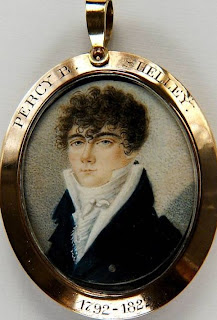 |
| Percy Shelley, poet mentioned in williez's blog |
Re-reading my response to a reader named williez, I think it's worth elevating to full blogpost status:
This question of "accessibility" comes up a lot in all the things I love, not just in poetry. Stephen Sondheim's musicals have been commercial flops and "inaccessible"; symphonic composers of the mid-20th century fell into opposing camps - those who continued to use rhythm, melody, and harmony to create dramatic or beautiful effects, and the others who aimed for a purity of technique unsullied by emotion - typified by Milton Babbitt's famous question to the public, "Who cares if you listen?" (surprise! He was Stephen Sondheim's tutor.)
Your response made me wonder at this part: Popular poetry rehashes an outmoded aesthetic: the single-subject "I," the "poem-as-truth," the "look how observant and sensitive I am," the "open-a-vein-and-let-my-truth-spill-out" hokeyness.
When I do connect to a poem, I would like to think it's because the writer has found a way -- be it an image, an anecdote, a bit of rhetoric -- to express something that I didn't know I knew and recognize immediately to be true.
I, too, can't stand the stuff that's all about "me, the poet." But I like the stuff about the poet's world that, deep down, is about me, too.
[See a curated list of my blogposts about Collins and many other poets at my page Poetry and Secular Psalms. I've been posting poetry of my own at a blog I call First Verse. Yes, it's drawn from my experience. And, yes, it's accessible.]
No comments:
Post a Comment